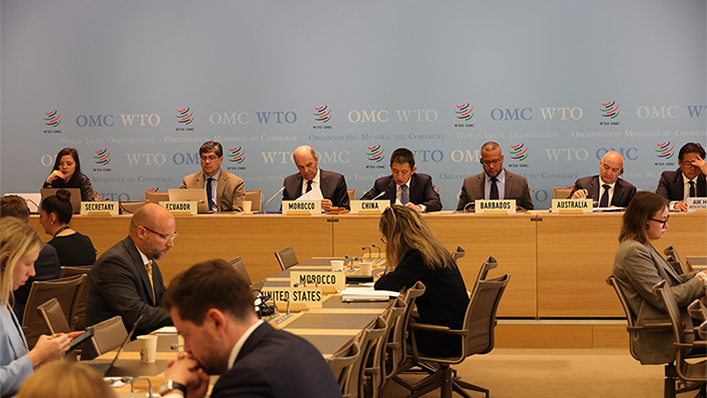
Ambassador Omar Zniber from Morocco and Ambassador Chenggang Li from China, co-chairs of the meeting, facilitated the discussion.
Morocco, on behalf of the coordinators of the Dialogue, introduced the so-called “draft zero” of the outcome elements, which highlights the Dialogue’s commitment to addressing the global issue of plastics pollution. The draft sets out a range of shared principles and priorities for collective actions, with the aim of effectively addressing this challenge.
The principles include enhancing collaboration and cooperation with other international organizations to prevent duplication of work, addressing challenges encountered by WTO members, in particular least-developed countries (LDCs) and small island developing countries (SIDs), ensuring transparency and engaging openly with relevant stakeholders.
Among the priorities are collaborating with the World Customs Organization (WCO) to support amendments to the Harmonized System (HS) for traded goods to ensure more effective monitoring and regulation of plastics trade and supporting the timely conclusion of the UN negotiations on a binding instrument on plastics pollution by 2024. Other priorities include promoting the adoption of sustainable and effective non-plastic substitutes, alternatives and re-use systems and facilitating access to technologies for environmentally sound waste management.
Furthermore, the document mentions the possibility of including a series of annexes that will, among other things, offer a menu of trade policy options drawn from their discussions for participating members to voluntarily select and implement.
Five coordinators of the Dialogue — Australia, Barbados, China, Ecuador and Morocco — emphasized the alarming state of plastics pollution and called for urgent action. They acknowledged the substantial efforts that led to the development of the draft outcome elements, stating that the document will serve as a powerful signal of support for the upcoming second round of negotiations of the United Nations Environment Programme (UNEP) Intergovernmental Negotiating Committee (INC), due to take place from 29 May to 2 June in Paris. The goal of these negotiations is to achieve a multilateral binding instrument on reducing plastics pollution by 2024.
They also noted that the Basel, Rotterdam and Stockholm Conventions have recently adopted technical guidelines for the sustainable management of plastics waste. They further underscored the crucial need to provide support to LDCs and SIDs, which bear the brunt of severe plastics pollution and frequently encounter difficulties in accessing adequate financing.
Participants welcomed the draft document and provided initial feedback on various aspects. Many reiterated the significance of coordinating with ongoing international processes. Some suggested prioritizing support for the ongoing negotiation process at the INC before delving into the implementation of a legal instrument that is not yet in existence. There were suggestions to incorporate best practices into the annex of the document and to make it an evolving document going beyond MC13.
Some participants stressed collective actions as a key focus of the document, suggesting the identification of a range of measures to address highly polluting products. Others recommended prioritizing environment-friendly substitutes rather than only alternatives. Further consultations were suggested for the cooperation proposals put forward to the WCO by the coordinators.
The chairs asked members and stakeholders to provide feedback by 26 June to facilitate revision of the document and circulation of the draft before the summer break. They urged co-sponsors to work towards a consensus on a high-quality final draft MC13 Ministerial Statement in December and encouraged them to engage more members in joining the Dialogue.
Technical briefings
During technical briefings, participants were presented with insights from various international organizations. The UN Food and Agriculture Organization shared its efforts in reducing plastics pollution in the agriculture sector. The International Bamboo and Rattan Organization introduced its “Bamboo as a substitute for plastic initiative”. The International Pollutants Elimination Network presented its study on “hidden flows” of plastics waste trade.
Workshop on plastics reduction and circularity
On 27 April, the Dialogue conducted its second workshop in collaboration with the United Nations Environment Programme. The workshop focused on trade strategies to promote reduction and circularity to tackle plastics pollution. More information about the workshop is available here.
Other matters
A small exhibition showcasing bamboo products as substitutes for plastics was organized on the sidelines of the meeting.
The next meeting of the Dialogue is slated for 21-22 September.
More information about the Plastics Pollution Dialogue is available on its dedicated webpage.
Share
Reach us to explore global export and import deals